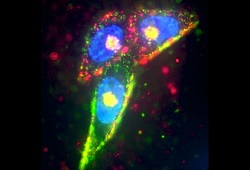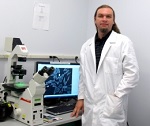 |
| Silver nanoparticles (glowing) accumulated in cancer cells--Courtesy of UCSB |
Researchers at UC Santa Barbara have concocted a new type of silver nanoparticle designed to deliver cancer drugs that can also dissolve and become inactive if it doesn't reach the tumor. The innovation solves some safety issues associated with nanotechnology and reduces side effects from the cancer drugs themselves, the scientists say.
Using plasmonics, which focuses an electromagnetic field and resonates under light, the scientists developed the particles to glow and clearly show how much of the substance was taken in by the cancer cells. They also employed an etching technique that chemically dissolves the nanoparticles if they haven't entered the cells. These particles left outside grow dim, allowing only the ones that penetrated the tumor cells to remain glowing, according to a UCSB report.
For the purposes of drug delivery, these nanoparticles could be used to carry RNA or DNA drugs into cancer cells, targeting the cells with a peptide on their surface. These drugs are notoriously difficult to deliver and require protection in the bloodstream.
The team published the study in the journal Nature Materials.
 |
| Gary Braun |
"The disassembly is an interesting concept for creating drugs that respond to a certain stimulus," lead researcher Gary Braun said in a statement. "It also minimizes the off-target toxicity by breaking down the excess nanoparticles so they can then be cleared through the kidneys."
And the particles could be used for diseases other than cancer, seeking target receptors present on organisms such as bacteria, according to the university report.
 |
| Erkki Ruoslahti |
"These new nanoparticles have some remarkable properties that have already proven useful as a tool in our work that relates to targeted drug delivery into tumors," UCSB nanomedicine professor Erkki Ruoslahti said. "They also have potential applications in combating infections. ... Silver is a locally used antibacterial agent and our targeting technologymay make it possible to use silver nanoparticles in treating infections anywhere in the body."
- here's the UCSB announcement
- and here's the abstract